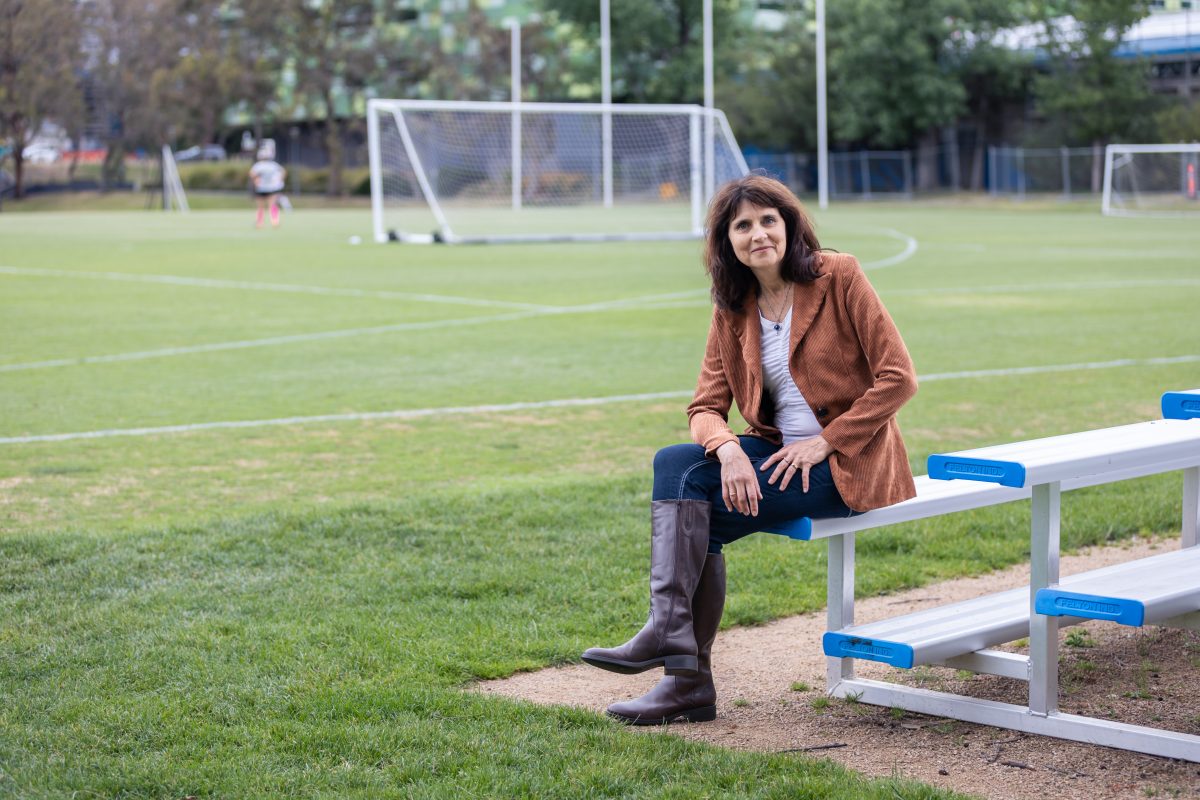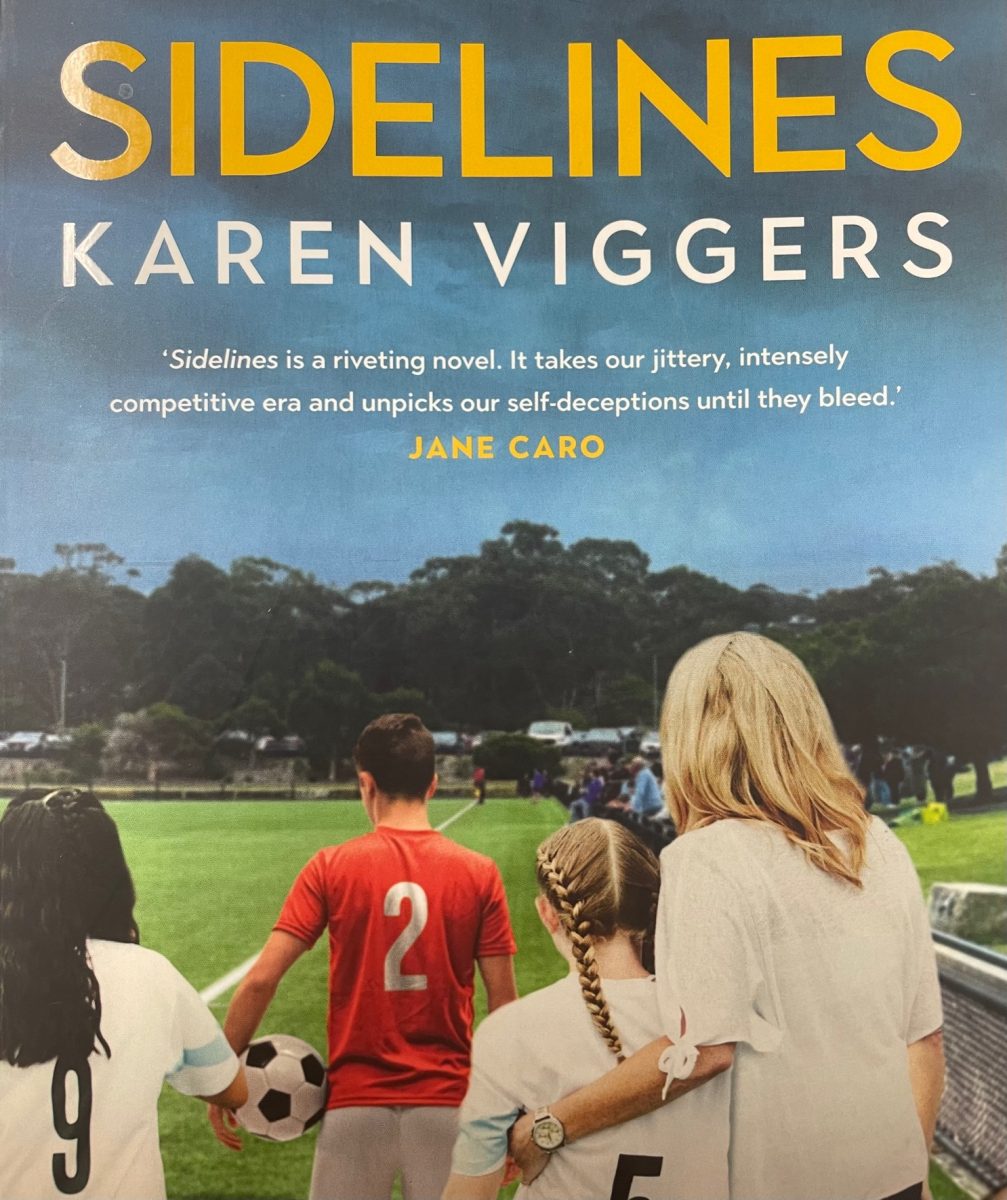
Author Karen Viggers says her own experiences kickstarted Sidelines. Photo: Michelle Higgs.
Author and veterinary surgeon Karen Viggers was a soccer mum for 14 years. Her kids loved the sport and she did stints as a junior referee when they finished playing.
“Sport is great for kids,” she says.
“They learn a lot about self-control, managing difficult situations with parents, things that can get out of hand. It’s really good life training.”
But after six years, her son turned to her one day and said, “I’m sick of the abuse. I’m done with this”.
The moment stayed with Karen, as did the 2014 Canberra U12 soccer brawl where parents joined the fray.
“My daughter could have been part of that, but she was injured at the time. The children were so distressed. Parents were banned from going to games when those teams met and the finals had security on the gates.
“I started to wonder what was underlying all this. Are these bad parents? Are they ordinary people who got carried away?”
It was the genesis for Karen’s new novel, Sidelines. The book begins with paramedics on a soccer field and a patient with a significant fracture. But how did injuries more consistent with a pub brawl happen in a kids’ soccer game?
We trace the story of Audrey, a gifted player from a privileged background with a father putting her under intense pressure. She plays in a boys’ team alongside working-class Katerina from a migrant background, also gifted and under pressure, but for different reasons.
They’re teenagers with all the usual tumult over body image, sexuality, identity and the future. A season proceeds that could result in A-League recruitment, even the Matildas, and the parents’ motivations, desires and obsessions are also under the spotlight.
Readers see all perspectives: part of Karen’s gift as a writer is hovering above complex stories without preference to a single viewpoint.

Sidelines by Karen Viggers is published by Allen and Unwin. Image: Allen & Unwin.
While Karen’s family experiences informed the book, the characters aren’t based on anyone. Soccer forms the backdrop, but the issues she’s describing exist everywhere, from basketball to ballet and the exam room.
“I think parents get over-invested. It only takes a few noisy, over-the-top ones who claim they are passionate – but what is passion? It becomes an excuse for very poor behaviour.
“If we asked parents why they want their children to play sport they’d say because it makes them team players, helps them win with grace, lose with dignity, make friendships and memories. Very few would say winning at all costs is the main thing, but that’s how some behave.
“There’s plenty of research that shows kids who are physically active do better in studies, and we know only a tiny handful will succeed at the highest level, so let’s discuss how to be better sports parents and make it work for our kids.”
Karen was tapped on the shoulder herself by a friend who said she was “a little over the top”.
“I needed to step back myself, so in this book, I’m trying to understand why parents drive their kids. There are different scenarios – maybe they’re living vicariously through their children or didn’t have the financial backing they needed to succeed themselves, or see the successes of their children as an indicator of their own success as a parent.
“I also wanted to get into the heads of young people so adults could have insight into all the stuff they’re trying to deal with as a teenager – the peer pressure, the social media, the questions about their identity and futures.”
Post Women’s World Cup, it’s a topical read. Karen says the book is for adults, parents, grandparents – anyone who is interested in how parents and children interact over expectations, pressures and dreams.
It’s a complex picture. Research shows parental pressure is not a positive factor in success, says Karen.
“Of course, you need parental support, but you cannot do it for your parents; the drive to succeed has to come from the child themselves – and, of course, you need natural talent, too. So where does support become pressure and pressure become obsession?
“This is a book designed to stimulate discussion and get people thinking. Maybe tap someone on the shoulder too about how they’re interacting with their kids.”
Sidelines is quite different from Karen’s previous books, including The Lightkeeper’s Wife, The Grass Castle and The Orchardist’s Daughter. They’ve been best-sellers, with a huge audience in France, in particular, where Sidelines will also be translated.
“I wasn’t sure my publishers would like this book, but I’m grateful they supported it. I think you can only write where the heat is, what’s urgent inside you.”
Sidelines is published by Allen and Unwin.













